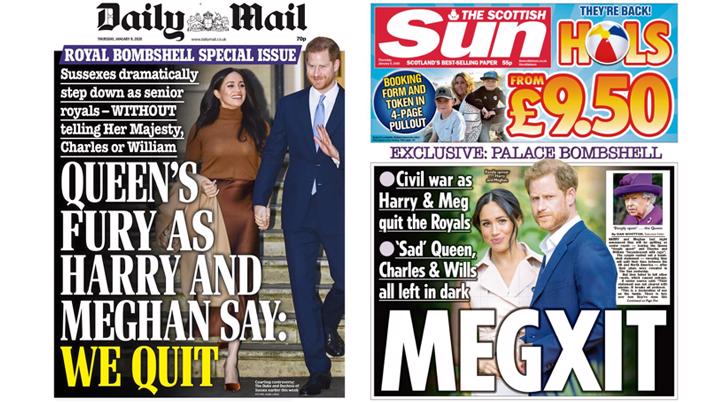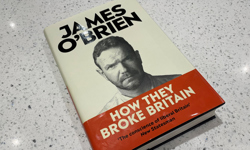
That’s it then. They’ve gone. Driven out by us, the print media.
There have been plenty of instances where newspapers have been accused of hounding celebrities and royals – most famously Princess Diana – and every time, the same defences are wheeled out: “They want the publicity when it suits”, “it goes with the territory”, “taxpayers’ money”, “public interest”, “free speech”, “if you don’t like it, go away…”.
Now they have.
There is no escaping the fact: this time, it really was the Press wot done it. The Duke and Duchess of Sussex said so in so many words when they announced their intention to decamp to Canada. And they’re following it up with court cases against the Mail on Sunday and The Sun.
So, the country has been deprived of arguably its most popular royal and the 94-year-old Queen has been deprived of time with her great-grandson, which reportedly makes her sad. Largely thanks to the very newspaper that cried, “Did the Queen deserve this?” when the pair opted to spend last Christmas with Meghan’s single mother rather than with the crowd at Sandringham. It’s impossible to resist turning the Mail’s pre-Brexit splash attack on rebel MPs back on the paper itself to ask, “Proud of yourselves?”
The Mail, its Sunday sister and other tabloids may not be proud, but nor are they ashamed or even conciliatory. The moment they were called out by the Sussexes, they went into traditional “doubling down” mode, gleefully reporting how the Queen was slapping them down and quoting courtiers who described the couple as petulant, entitled, selfish and the like.
The knives even came out during the couple’s brief return from Canada for their farewell royal duties. Day one was all gushing “Markle sparkle”; but day two was “Meghan at war with Camilla” because the visiting duchess’s appearance at the National Theatre had apparently upstaged the resident duchess’s speech about domestic abuse.
Day one was all gushing “Markle sparkle”; but day two was “Meghan at war with Camilla”.
Meghan vs Kate
For all the “royal exclusives” and “inside stories”, we can’t really know all the nuances of what goes on in the Palace. But we can see with our own eyes how the Press has reported Meghan and notice how different the tone is from that when the Duchess of Cambridge is out and about.
Last October, before matters came to a head, the Mail carried a puff that accused the Palace of “stoking hysteria” over Harry and Meghan. It made me think “pot and kettle?” and prompted a little research into that one paper’s coverage over the previous year:
- Meghan had been offered advice from Sarah Vine, Jan Moir, Richard Kay, Libby Purves, Stephen Glover, Patrick Jephson and others on where she was going wrong on everything from Wimbledon etiquette to the fact that her husband seemed to wear a lot of grey.
- She featured on the front page 28 times. Eight of those were out and out positive, the rest were negative, critical or snide. Bear in mind that she had a baby during this time – a baby that prompted a 24-page supplement when not a single photograph of the infant was available.
- That compared with 14 appearances by the Duchess of Cambridge, all of them positive.
- In September, Harry and Meghan went on a 10-day tour of Africa that did not feature on the Mail’s front page once. The following month, William and Kate went to Pakistan. Kate’s photograph appeared on the front on four successive days and the trip was rounded off with a “stunning eight-page souvenir of our Jewel of the East”.
That, of course, is all a matter of marketing and what sells. As one Mail exec said: “Meghan doesn’t do it for us.”
But is that sufficient explanation for the frankly hypocritical approach to the two duchesses – as brilliantly laid out by BuzzFeed earlier this year – where lilies of the valley in one royal bouquet have been charmingly picked from woodland while in another they are a toxic threat to the bridesmaid’s health; where Kate’s scented candles in the Abbey are fine, while Meghan’s air fresheners in St George’s Chapel are beyond the pale; where Kate’s avocado is her husband’s caring antidote to morning sickness, while Meghan’s is linked to human rights abuse, drought and millennial shame?
If you give the papers the benefit of the doubt on the racism claims; if you concede that the Frogmore refurbishment and eco-preaching while flying all over the place were ripe for scrutiny (which is not a synonym for criticism); if you accept absolutely the right of a free press to write about any subject it chooses… it still looks pretty bad.
Especially when you consider that our tabloid newspapers have written almost four times as many stories about the couple since Meghan entered Harry’s life four years ago as they have about Prince Andrew since he was first linked to the Epstein scandal nearly a decade ago.
In September, Harry and Meghan went on a 10-day tour of Africa that did not feature on the Mail’s front page once.
Talking about ourselves
Should a newspaper observe some self-denying ordinance when it is party to a legal action or is it reasonable to use your publication to try to win friends in the court of public opinion, if not in the court in the Strand? Well, no newspaper could underplay the couple’s departure and surrounding negotiations on titles, branding and so forth, but the MoS does seem to have taken its foot off the pedal a little from the multi-page Thomas Markle extravaganzas of the past two years (one of which is the subject of the Sussex’s copyright action), while still speculating about Doria, the “steely secret force behind Megxit”.
Perhaps the bigger question is how should newspapers report themselves in all circumstances? The Mail on Sunday ran a 600-word page 4 lead when Ipso ruled in its favour after Harry complained about the reporting of some wildlife photographs. But it ran not a sentence when a beautician whose business and life had been devastated by one of its “investigations” won libel damages last month. Indeed, no national newspaper reported the case of Danielle Hindley, although it was featured on both television and radio, thanks to social media and coverage by Byline and the Hacked Off campaigner Brian Cathcart.
Cathcart pointed out that Hindley had complained to Ipso about a feature on cosmetic procedures and had the complaint upheld, but the promised page 2 correction was relegated to page 8 “because there was a big story”. That story, coincidentally, was a seven-page “I hung up on Prince Harry” Thomas Markle special. Hindley sued for libel but, even with the adverse regulator ruling, the paper said it intended to defend its reporting and spun out proceedings for 18 months before admitting liability in court and paying up.
Cathcart berates the cruel delaying tactics and condemns what he believes is a culture of “omerta”, of dog not eating dog in what used to be Fleet Street. That sounds a bit melodramatic, but there certainly seems to be a reluctance across the board to report negative stories about the Press. There’s a lot of “Our campaign succeeds” and “Why the free Press is vital”, but very little “We’re under fire for this…” or “We’re on trial for this…”
When Caroline Flack killed herself, social media was awash with people accusing newspapers of “hounding her to her death”, while the Press itself was busy saying “Look over there!”, raging against the Crown Prosecution Service and ITV.
When Flack was arrested for assault, The Sun carried a splash headlined, “She tried to kill me” and an inside spread saying, “Flack attack like a horror movie”. A week later, there was another splash, “Flack’s bedroom bloodbath”. But after her death, it rounded on the “Cruel Prosecution Service”, demanding to know why it was going after “a vulnerable woman in a minor incident”. So, the story went from someone being in fear for their life to a minor incident. But nothing about any role newspapers might have had in the tragic outcome.
To be fair, “hounding” seems an odd word for the press treatment of Flack up to the point of the assault: the Sun had carried some 2000 articles about her and interviews with her over the previous decade, almost all of them friendly and supportive, positive PR guff. But why was Flack so fearful of the upcoming court case? Because of her actual appearance? The possible punishment? Or because of the inevitable huge press coverage? These elements did not get an airing in the rush to blame anyone and everyone else for her death.
There certainly seems to be a reluctance across the board to report negative stories about the Press.
Reporting trans issues
Another example of the way we shy away from self-examination came last year, when The Times’s former Scotland night editor sued for unfair dismissal, claiming that she had been made redundant because she was a transgender woman. Katherine O’Donnell alleged that the paper had a transphobic agenda and cited the many “negative” stories and columns it had published. The case was taken sufficiently seriously for the paper to wheel out a dozen very senior executives from editorial and HR, including the editor himself, who told the tribunal there was definitely no such agenda. Had any other household-name business – especially the BBC – been taken to court in such circumstances, with such a parade of high-powered witnesses, it would have been widely reported. But until the verdict came in – in favour of The Times – it was ignored by almost everyone. The tribunal concluded that there were sound business reasons for the redundancy and that O’Donnell had been treated reasonably. It specifically declined to comment on whether there was a transphobic agenda, not wanting to risk being seen seeking to influence or curb a free press.
And, of course, newspapers are free to write about whatever they think interests their readers. The Times seems to think its readers have an abiding interest in transgender issues. It splashed on the subject on two successive Saturdays in February, coupled with spreads and leaders inside, and followed up with a double-page essay by Janice Turner the following week.
The first of the splash stories was about a judge’s comment on “Orwellian” hate-speech policing being a threat to free speech. The man who brought the (successful) case had been visited by the police – but not charged with anything – after posting an anti-trans tweet. He was photographed on the inside of the paper with a banner carrying a slogan that is widely regarded as offensive by trans people.
The Times could naturally argue that its story was about freedom of speech, but if the offensive tweet had been racist or sexist rather than anti-trans, would the paper have been quite so interested? Would it have run a photograph of a banner bearing a racist slogan? No one else gave it anywhere near such prominence.
Phone hacking
The argument usually put forward to explain the Press’s failure to report on itself is that “readers aren’t interested in the ins and outs of newspapers”.
They are, however, definitely interested in Prince Harry. There have been more than a thousand stories about him in The Sun in the past year. But not the one about the court case in which the paper was accused of paying £1,500 to a private investigator for information about a phone call with his former girlfriend Chelsy Davy. Only the i (and Byline, the website which published Cathcart’s piece about Danielle Hindley) thought the High Court hearing in which Harry is suing News Group Newspapers worth reporting.
Perhaps that was because it was a pre-trial hearing? Perhaps they’ll all do more when the “proper” case starts. If it ever does.
Yet, what’s this here on The Sun’s front page? “Amber v Depp in court” and inside, “Let’s drown her before we burn her” under a strapline, “Hollywood battle comes to UK”. The text Johnny Depp allegedly sent to the British actor Paul Bettany was juicy stuff and was reported by most newspapers. But this, too, was a pre-trial hearing. Not of a battle between Depp and his ex-wife, but between Depp and The Sun, which he is suing for libel – a fact mentioned in the sixth par.
All news judgments are subjective: the Depp story was real tabloid gold, but surely Harry’s case must be at least silver or bronze, not something to be ignored?
News UK, which still insists that phone hacking was limited to the News of the World and that nothing illegal happened at the Sun, has paid out millions and millions to buy off victims to ensure they don’t have their say in open court. It will be interesting to see whether the Prince takes the money or keeps going and forces the Sun into what would be an explosive admission. Then there’s the copyright case against the Mail on Sunday.
There is a real chance that both Harry and Meghan will at some stage appear in the witness box in the Strand. It will have to be reported. And we all know who the public will then see as the baddies.
This article was first published in InPublishing magazine. If you would like to be added to the free mailing list, please register here.












